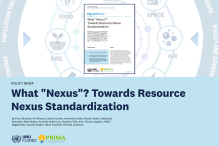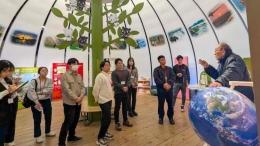On the sidelines of the UN High-Level Political Forum, UNU-CPR, in collaboration with the Ministry of the Environment of Japan and Keio University, and with support from the Environmental Research and Technology Development Fund (Ministry of the Environment, Japan) and the AEON Environmental Foundation, convened a roundtable dialogue on shaping the global development agenda beyond 2030.
The session opened with remarks from Dr. Nicole Goldin, Head of the Equitable Development Pillar at UNU-CPR, who underscored the importance of early, inclusive agenda-setting conversations and reflected on the MDG-to-SDG transition, current challenges and opportunities, how they might inform a future framework. She was joined by Kentaro Doi, Vice-Minister for Global Environment at Japan’s Ministry of the Environment, and Professor Norichika Kanie, Vice-Director of Keio STAR (Sustainable and Transformative Actions for Regeneration), Professor at Keio University, and Nonresident Fellow at UNU, to set the stage for a roundtable discussion on what a post-2030 framework should prioritize and how it should be shaped.
As momentum builds toward the 2027 SDG Summit, participants – representing a diverse range of institutions including UN DESA, JICA, IISD, SDSN Germany, The Millennials Movement, the Finnish National Commission on Sustainable Development and others – shared perspectives (under Chatham House rules) on past processes, key global trends, development dynamics, and the cooperation landscape and how they might inform a future framework that is more inclusive, equitable and globally resonant.
Among the suggested priorities the dialogue highlighted:
- Ensuring stronger local ownership and grounded data systems
- Reflecting today’s geopolitical and environmental realities
- Amplifying the voices of youth, civil society and Global South actors
This timely exchange reaffirmed the value of inclusive, cross-sectoral collaboration in shaping sustainable futures – well beyond 2030.


